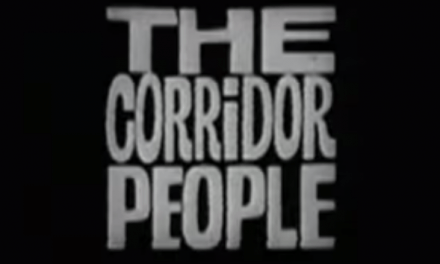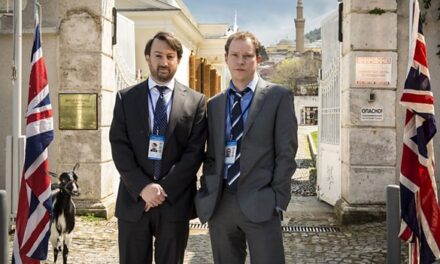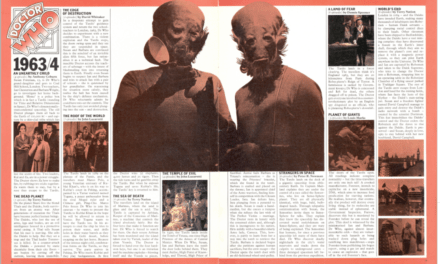This year has marked the 20th anniversary since the death of an important British television screenwriter, Dennis Potter. The BFI has commemorated Potter and his work through scheduling a complete back catalogue re-screening of his oeuvre with talks and presentations this year, and scheduled for next year (see Press Release). The catalogue thematized and curated into four themes ‘Politics and Betrayal’, ‘The Outside Inside’, ‘Faith and Redemption’ and Sex and Death’ offers not a chronological approach to the works but a curation that is anchored around the notion of an ‘auteur’, with Potter as the ‘ultimate outsider’ and ‘obsessed by his own demons’. Presented in terms of a ‘re’-assessment, this celebration of past television places Potter in the present for old and new audiences alike. This is less about exploring Potter’s work as it was first watched and more about the cinematic re-experience of the television plays, dramas and films as canonical. This accords with how most current mediations of Potter present the man as a creator of pioneering television drama. As the Potter Matters blog states:
One of a handful of British writers, producers and directors who from the early 1960’s onwards pushed at the boundaries of what television drama could do, he remains an influence on many of today’s most significant television writers. Dennis Potter most certainly still matters!
However, in our research for our most recent publication Remembering Dennis Potter through Fans, Extras and Archives (2014), we took the view that Potter matters to a different set of stakeholders in the cultural memory of television. That re-experiencing and remembering Potter in the everyday spaces of homes, communities, around television sets, with the works drawn from the shelved collections of DVDs offers a different set of values and meanings that say less about an auteur and more about community memory.
Our research findings were drawn from our public engagement activities for the Heritage Lottery funded Dennis Potter Heritage Project (2010-2013) with the Dean Heritage Centre, Soudley Gloucestershire and the Voices in the Forest Community Interest Company. Through oral history interviewing, digital storytelling, visual ethnography, participant observation of archival practice and community film work, we were able to immerse ourselves in the process of acquiring a written television archive and using this as the focus for memory work in the region. Thus, we were less interested in the memories of directors, producers, the BBC, ITV, or the BFI, all of whom, to varying degrees have been interviewed, made commemorative programmes on TV and Radio, written editorials in The Guardian, produced exhibitions in London or screenings in selected regions. Rather, the audience, the fan and the materiality of the evidence of paper and tape archives that accumulate in private and public collections, has been rather neglected.
We found that the desire to move Dennis Potter’s work into the schemata of high culture finds his television work publicly viewed in a cinematic theatre in London. This bears no resemblance whatsoever to the material living room conditions of the 1970s and 1980s where millions of people viewed Pennies from Heaven (1978) or The Singing Detective (1983) as not so much appointment television (there was much less competition for attention) but as a well-remembered media event. What has Potter made for us now? How much will we be shocked? Viewed in a theatrical setting, Potter’s television is re-cast, not as popular culture (as it was), but as a form of quality television from the past, and as an origin of or precursor for more recent HBO experimentation in drama, for example.
Memories and archives tell a different story and in their re-telling they keep those differences alive. As Carolyn Steedman eloquently puts it in Dust: The Archive and Cultural History, the archivist is in a ‘grubby trade’ for: ‘You know perfectly well that the infinite heaps of things they recorded, the notes and traces that these people left behind, constitute practically nothing at all’ (2001, 18). Only some of these traces and evidence end up in archives, such as BBC Written Archives at Caversham. Television has suffered this ‘nothing at all’ more than most. Early tape so expensive it had to be re-used alongside a perceived lack of cultural value has meant that only from the late 1970s has a secure policy and governance over retaining television broadcasts really been practiced. Memories, on the other hand, of working in and with television provide alternative accounts of continua and community, as well as the change and disruption that an historical approach highlights. The AHRC funded projects Spaces of Television: Production, Site and Style led by University of Reading; A History of Television for Women 1947-1989 led by University of Warwick; History of Forgotten Television Drama led by Royal Holloway University and Women’s Work in British Film and Television(1933-1989) led by University of Newcastle, are all current projects that are examples of a new kind of memory work around production histories.
In our research, we have been interested in the communities that have supported, assisted in producing, watched and collected television, and a case study of the community of the Forest of Dean, Gloucestershire, described as Potterland, is an important example of what we would call hyperlocal memory: A very specific kind of cultural remembering through reference to the production of Potter’s works in the Forest that uses those works to shore up and ‘shore up’ certainties about regional identity and continua of cultural practices. We were not the only ones to spot this unique connection between Dennis Potter’s television production in the Forest and the continued legacy he has played out through the communicative memories of local residents. Not only is the Dennis Potter written archive now held at the Dean Heritage Centre, Soudley but one of our research team was production consultant for the recent BBC Radio 4 Open Country programme Dennis Potter and the Forest of Dean broadcast 13th September 2014.
It is deeply heartening to hear the participants being interviewed having the opportunity to express their memories of Potter’s works being produced in the Forest. To hear them incorporate past television production not into a high culture aesthetic of cinematic value but into a hyperlocal community memory to be explored in the homes, gardens and trees of this ancient woodland with all its ancient Rights, demonstrates that television exists outside the flow (as many television scholars have argued). If, as Olick states ‘the past is remade in the present for present purposes’ (2011, 227), then ‘who’ gets to remake past television in the present for present purposes is just as important as the ‘what’ and the ‘how’.
Dr Joanne Garde-Hansen is Associate Professor of Culture, Media and Communication at the University of Warwick. From 2009-2013 she was director of the Research Centre of Media, Memory and Community (University of Gloucestershire, UK). She has co-edited Save As…:Digital Memories (Palgrave 2009) with Hoskins and Reading, authored Media and Memory (Edinburgh University Press 2011), co-edited Geography and Memory (Palgrave 2012) with Owain Jones and co-authored Emotion Online: Theorizing Affect on the Internet (Palgrave, 2013) with Kristyn Gorton. Joanne leads the academic research on a number of community projects focused on media, memory and local cultural heritage. She was co-investigator on the ESRC Sustainable Flood Memories Project (J.Garde-Hansen@warwick.ac.uk) and is currently principal investigator of the project Inheriting British Television: Memories, Archives and Industries.





